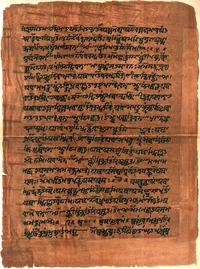
Photo from wikipedia
We consider the quantum evolution [Formula: see text] of a Gaussian coherent state [Formula: see text] localized close to the classical state [Formula: see text], where [Formula: see text] denotes… Click to show full abstract
We consider the quantum evolution [Formula: see text] of a Gaussian coherent state [Formula: see text] localized close to the classical state [Formula: see text], where [Formula: see text] denotes a self-adjoint realization of the formal Hamiltonian [Formula: see text], with [Formula: see text] the derivative of Dirac’s delta distribution at [Formula: see text] and [Formula: see text] a real parameter. We show that in the semi-classical limit such a quantum evolution can be approximated (with respect to the [Formula: see text]-norm, uniformly for any [Formula: see text] away from the collision time) by [Formula: see text], where [Formula: see text], [Formula: see text] and [Formula: see text] is a suitable self-adjoint extension of the restriction to [Formula: see text], [Formula: see text], of ([Formula: see text] times) the generator of the free classical dynamics. While the operator [Formula: see text] here utilized is similar to the one appearing in our previous work [C. Cacciapuoti, D. Fermi and A. Posilicano, The semi-classical limit with a delta potential, Ann. Mat. Pura Appl. 200 (2021) 453–489], in the present case the approximation gives a smaller error: it is of order [Formula: see text], [Formula: see text], whereas it turns out to be of order [Formula: see text], [Formula: see text], for the delta potential. We also provide similar approximation results for both the wave and scattering operators.
Journal Title: Reviews in Mathematical Physics
Year Published: 2022
Link to full text (if available)
Share on Social Media: Sign Up to like & get
recommendations!